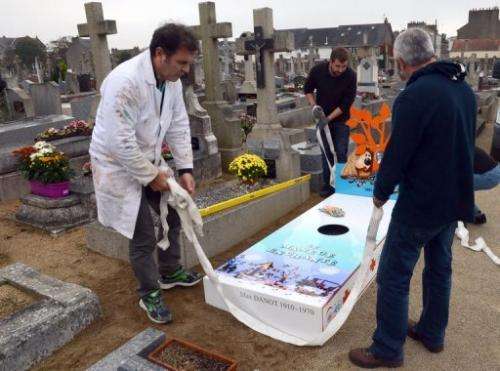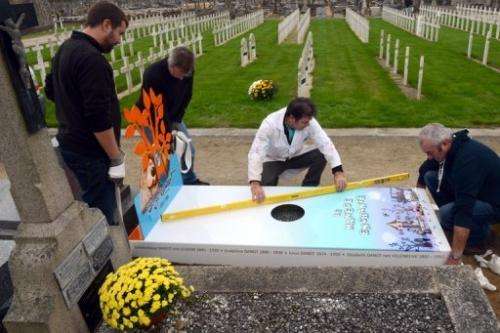'Digital eternity' beckons as death goes high-tech

Death is no longer the fusty business it once was: from swipeable bar codes on headstones to designer urns, webcam-based ceremonies and virtual memorials, funerals have shot into the 21st century.
Can't make it to a faraway funeral? No problem. A growing number of undertakers will let you take part via the web, with mourners hooking up to join the ceremony via a secure Internet connection.
"Families are more and more spread out, these days people can have relatives at the four corners of the country or the globe, far from their place of birth," explained Eric Fauveau, who operates webcam services for French crematoriums.
Relatives can even opt to keep a copy of the ceremony on DVD, as part of the add-on cost of 100 to 195 euros ($130 to $250).
For the truly high-tech touch, several undertaking firms have started embedding bar codes at grave sites, to be scanned with a smartphone to call up an online biography complete with pictures, videos or tributes to the deceased.
Seattle-based Quiring Monuments began offering the QR, or Quick Response codes—commonly used in ad campaigns—last year, and French start-up "Memory History" and undertaker Chester Pearce from England followed suit this year.
Pitched as much at relatives as strangers curious to find out about the deceased, the bar code service comes with a price tag ranging from $75 in the United States to up to £300 (370 euros/$480) in Britain.
Far-flung families wanting to post condolences, light a digital candle, share photos or memories, can choose from dozens of online memorial sites, a well-established US phenomenon that has newly caught on in Europe too.
"A little piece of digital eternity," is how Fauveau, who launched one such service in France, describes it.

Increasingly part of the Facebook generation, the fast-growing ranks of web-literate seniors are a key reason for the shift of memorial services online.
Facebook itself offers the option of turning a personal page into a virtual memorial by "freezing" the profile after its owner dies, but leaving it open to tributes.
The web also enables people approaching the end of their lives to reach out before they go.
One example of this is the French foruforever.net, launched two years ago under the slogan "Death is Part of Life", which today counts some 300 "life albums", according to its founder Sandrine Tenaud.
"Since death has become such a taboo, people are often left in a panic when the time comes to reach out to their relatives," Tenaud explained. "The web makes it easy."
As members of the baby-boomer generation take their final bow—and the place of religion declines in the West—funeral ceremonies are also changing drastically, with a large place opening up for music and humour.
"You are celebrating a life, not a death," summed up Herve Mankowski, an undertaker from Brest in western France, who played AC/DC's "Highway to Hell" as the tongue-in-cheek soundtrack for one recent funeral.
With cremation on the rise in the West, accounting for 30 percent of funerals in France, and more than 70 percent in Britain—among the highest shares in Europe—firms are also tapping into the need for modern types of physical memorial.
Urnea, a young firm set up in the Pyrenees by two French artists, Cyril Amouroux and Benoit Alcouffe, dreamed up designer urns that can be stacked into a column, for members of a same family for instance.
Made from aluminium-titanium alloy, their urns come with a 99-year warranty.
As for your traditional headstone, you can jazz that up, too.
The start-up company Funeralconcept, from Vendee in western France, offers tomb plates in laser-sculpted steel that can be carved into the shape of a musical instrument, or painted with a glorious sunset.
"Since I was a blacksmith, some friends asked me to imagine something for one of their friends," explained the firm's founder Freddy Pinault, who has notched up several dozen orders since launching in September.
Among the most recent, a colourful monument to the memory of the late Serge Danot, creator of the cult children's television classic "The Magic Roundabout", who died in 1990.
(c) 2012 AFP



















